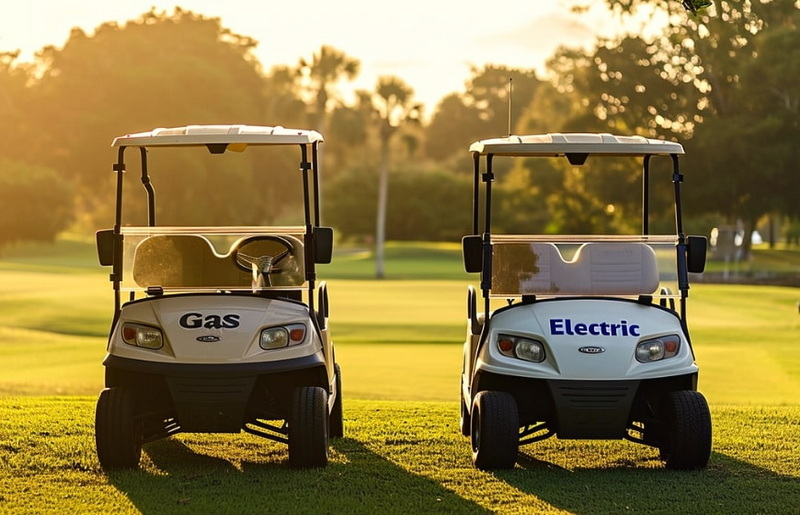Content Menu
● Key Features of Gas Golf Carts
● Key Features of Electric Golf Carts
● Performance Comparison
● Maintenance and Longevity
● Cost Analysis
● Use Cases
● Conclusion
● FAQs
>> 1. Which type of golf cart is more reliable?
>> 2. How often do gas and electric carts need maintenance?
>> 3. Can electric carts be used in areas that require more power?
>> 4. What is the average lifespan of a golf cart?
>> 5. Are there any environmental benefits of electric golf carts?
In the world of golf carts, the debate between gas and electric models continues to be a hot topic among avid golfers and recreational users alike. As both options come with distinct advantages and disadvantages, potential buyers are often left wondering, "Is a gas golf cart better than electric?" This article aims to explore the key differences between gas and electric golf carts, weighing their respective benefits to help you determine which option may be worth your investment.

Key Features of Gas Golf Carts
Gas golf carts are powered by a combustion engine, which typically offers several advantages:
- Power and Speed: Gas carts often deliver higher performance in terms of speed and power, making them suitable for traversing hilly terrains.
- Range: With a gas tank, these carts can travel longer distances without frequent refueling, allowing for extended use on the golf course or property.
- Durability: Generally, gas models can handle rougher conditions and are less prone to wear and tear compared to electrics.
Key Features of Electric Golf Carts
On the other hand, electric golf carts have their own set of benefits:
- Environmental Impact: Electric models produce zero emissions, making them a more eco-friendly choice.
- Quiet Operation: Operating softly, electric carts provide a more serene experience on the golf course, allowing for better focus on the game.
- Lower Operating Costs: Although electric carts may have a higher initial cost, their lower maintenance and energy expenses can add up over time, making them cheaper in the long run.
Performance Comparison
When comparing the performance of gas versus electric golf carts, several factors need to be taken into account:
- Acceleration and Speed: Gas golf carts typically offer quicker acceleration and can reach higher speeds compared to electric ones. This feature might be essential for some golf enthusiasts who prioritize speed.
- Torque: When it comes to climbing steep hills, gas models usually outperform electric carts due to their superior torque. However, newer electric models are closing the gap with advanced technology.

Maintenance and Longevity
Another essential aspect to consider is maintenance. Gas golf carts tend to require more frequent servicing due to their mechanical parts. Owners should prepare for oil changes and engine maintenance on a regular basis. Conversely, electric carts benefit from less mechanical complexity:
- Fewer Moving Parts: Electric models usually require less maintenance due to having fewer moving parts, eliminating many issues associated with gas engines.
- Battery Replacement: A key consideration for electric golf carts is the battery's lifespan, which can vary. Owners must prepare for eventual replacement costs and schedule regular battery checks.
Cost Analysis
Purchasing a golf cart is a significant investment, and understanding the cost implications is crucial:
- Initial Investment: Gas golf carts typically have a lower initial cost, while electric models can be higher upfront due to their technology. However, evaluating the long-term costs is vital.
- Fuel vs. Electricity: Gas prices can fluctuate significantly, whereas electricity is often more stable. In the long run, electric golf carts may turn out to be cheaper to operate.
Use Cases
Understanding how you plan to use your golf cart can also influence your choice:
- Golf Courses: For traditional golfers, many courses have rules regarding cart types, and electric carts may be preferred for their environmental benefits.
- Personal Use on Properties: If you own a larger piece of land, gas carts may be more practical for their range and power, especially on uneven terrains.
Conclusion
In the debate of whether a gas golf cart is worth the investment compared to electric models, both options have compelling benefits. Ultimately, your choice depends on your specific needs, including the terrain you will navigate, usage frequency, and your budget. Gas golf carts provide speed and power, whereas electric models excel in environmental consciousness and operating costs. By carefully assessing these elements, you can make an informed choice that meets your golfing and recreational requirements.

FAQs
1. Which type of golf cart is more reliable?
Gas golf carts generally have a reputation for durability; however, electric carts are becoming increasingly reliable with technological advancements.
2. How often do gas and electric carts need maintenance?
Gas carts require regular oil changes and engine servicing, while electric carts need battery checks and occasional tire maintenance.
3. Can electric carts be used in areas that require more power?
Electric carts have improved over the years and can handle moderately hilly terrains, but gas carts are still better suited for steep hills.
4. What is the average lifespan of a golf cart?
On average, both types can last 15-20 years with proper maintenance, though electric carts may need battery replacements every 5-7 years.
5. Are there any environmental benefits of electric golf carts?
Yes, electric golf carts produce zero emissions, making them a more eco-friendly choice and suitable for use in residential areas.










































